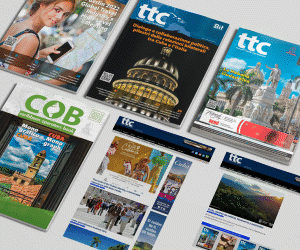The Royal Caribbean Group has announced a major step in its journey towards sustainability: “Destination Net Zero,” a wide-ranging decarbonization strategy that includes its commitment to setting science-based targets and achieving net-zero emissions by 2050, Travel2latam reported.
The project is the result of decades of progress and deep commitment to embed sustainability throughout the organization. Over the next 18 to 24 months, the cruise company will develop targets that will be validated by the “Science Based Targets initiative (SBTi),” the first engagement of its kind in the cruise industry.
Work will begin following the publication of the SBTi’s maritime transportation methodology. Science-based targets show companies how much and how quickly they need to reduce their greenhouse gas (GHG) emissions to help mitigate global warming.
Richard Fain, Chairman and CEO of Royal Caribbean Group, said that “decades ago, we set out on a course to advance sustainability; our vision now is to realize carbon-free cruising over the next two decades,” and added that “we are announcing the most important destination of all in our company’s history – Destination Net Zero – an ambitious strategy to cut emissions, protect our oceans, and ensure the viability of the hundreds of destinations that our guests and crew members care deeply about.”
Along the journey to “net zero,” there will be milestones that will be key to moving forward. One of the most ambitious includes the delivery of a “net-zero” cruise ship by 2035, for which the company will rely on strong partnerships with governments, suppliers and shipyards with the aim of developing alternative and accessible fuels and technologies.
The Royal Caribbean Group’s approach to achieving these measurable goals builds on its track record of designing and operating some of the sea’s most energy-efficient ships. Thanks to improved hull design and system upgrades, such as AC chillers that use 30-40% less energy, the group has consistently delivered a new generation of ships between 20 and 25% more efficient than their predecessors.
Based on Silversea Cruises’ “Evolution” Project — the cruise industry’s first hybrid-powered ship set to debut in the summer of 2023 — to the Kansas wind farm that will offset up to 12% of scope 1 and 2 emissions per year, the Royal Caribbean Group is already executing its strategy.
Royal Caribbean’s journey to reduce its environmental footprint began nearly 30 years ago with Save the Waves, an ambitious effort that grew from a recycling program to a company-wide approach to incorporating challenging, achievable and measurable sustainability goals into the foundations of corporate culture. Over the next three decades, protecting the planet’s limited natural resources organically evolved from a choice to a way of life for the company and its employees.
In 2016, the Group built on this legacy of progress and commitment by partnering with the World Wildlife Fund (WWF). With the goal of ensuring long-term health of the oceans and fulfilling a more sustainable cruise vision, the Royal Caribbean Group set ambitious goals for 2020 to reduce its environmental footprint, support the conservation of oceans globally and raise awareness among the company’s more than 5 million passengers on the importance of the conservation of the oceans. Earlier this year, the company announced that it had met or exceeded its 2020 targets, with the exception of the sustainable seafood supply target (expected to be met in 2022), which was affected by the suspension of travel due to the pandemic.

MORE NEWS











